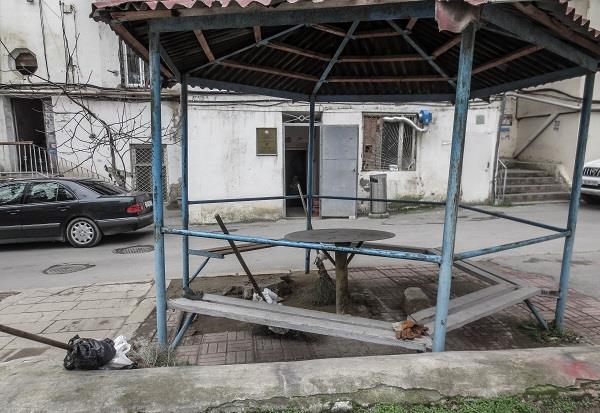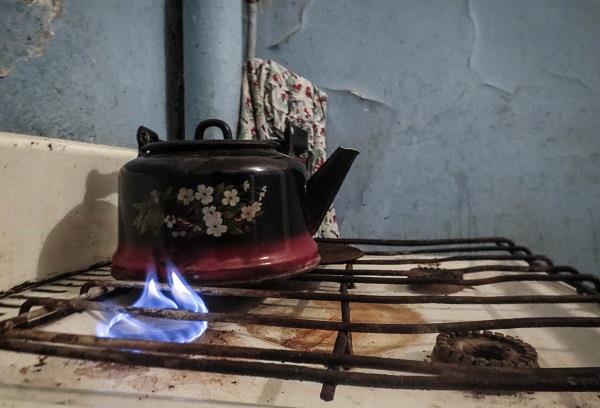Pauper Extorters
Housing Maintenance Offices are stuck in our memory as petit bribing, bureaucracy and rudeness centers.
Set up in 1959, Housing Maintenance Offices were engaged in utility of the state housing facilities – that is carrying out necessary works for residential and housekeeping areas – cleaning, landscaping, waste disposal.
“A lawn outside the Art School in Baku center. A lot of garbage is thrown out from the windows of this honorable institution.
Until recently, this activity was regulated by the Housing Code of Azerbaijan SSR, introduced in 1982. The Housing Maintenance Offices were responsible for saving and reasonable use of housing facilities, servicing residents at the highest level and controlling conditions of buildings, houses, balconies, etc. Earlier, HMOs were intended to do all repair works and solving current problems such as leaky roofs, lack of heating, flooded cells, etc.


Housing Maintenance Offices #21 has known better times

No wonder that the HMO employees excite pity
One of the main functions of the HMOs was issuance of certificates to relevant institutions and agencies: the so-called Form #2, specifying number of persons, registered in a flat; local municipal statement of residence, issued to each resident individually on request.
Once, not only street cleaners, grumpy passport officers, accountants served in HMOs, but also locksmiths, plumbers and electricians worked there. Nowadays, they have all “distributed in different structures, responsible for electricity-gas-water. Thus, in case of urgent repair, residents must not call HMO, but contact Azersu (water), Azerishig (electricity) or Azerigas (gas).
HMO former employee, Eteri Zeynalova is telling: “There were special personnel in HMO. Every morning they went outside and walked about the territory. They were responsible for the order and cleanness. Besides, they kept an eye on repair works, installation of windows on balconies. Having returned back to HMO, they immediately reported to their chief.
It was done to get a bribe for illegal enlargement of the area, windowing balconies or “appropriation of a certain area of the yard. Of course, those people were not issued any document; they paid to HMO employees for not bothering them.
Some people breed chickens in the yard outside a house, others have motorsycles
Numerous bribes is the main income of the HMO structure, as employees’ wages are minimal – AZN100-120. All their hopes are linked with the residents’ money, given in respect.
Very often the resident simply sympathize with poorly-dressed employees of the “dying office when they begin professionally begging for five Manats for a certificate.
Besides, according to E. Zeynalova, the HMO passport office must be connected with the district police officer, who must know every resident in his/her district. The HMO employee assists him/her. Given the records in the register of tenants, the HMO employee informs him/her on residents in each flat.
In August 2009, a new Housing Code of Azerbaijani Republic came into effect. Under the Code, HMOs were legally deprived of the control over utility of the housing facilities. The HMO services covered only the state-owned flats, but not the privatized ones. Taking into consideration the fact that most flats have been privatized, the residents should not cherish hopes for getting free-of-charge services. According to the new Code, control over the housing facilities shall be transferred to the local municipalities. As for many-storied buildings, they shall be managed either by residents-flat owners’ specialized consumer co-operative or by a managing organization. HMOs are not mentioned in the Code.
At the same time, in May 2010, the amendments were introduced to the Housing Code of Azerbaijan to officially legalize HMOs functioning. Under these amendments, HMOs were subordinated to the Housing and Utility Department and belonged to the executive power. Under the Code, if many-storied residential buildings are managed by local bodies of the executive power, then, formally, it is possible to make an agreement with HMOs, as with one of the structure of the executive power, on management and service of the many-storied buildings.
#4 Alesker Alekperov street. The waste here has not been removed at least for half a year
At present, the HMOs defy a legal basis of the Code, which specifies a possibility of making an agreement with a resident, provided that this agreement is made voluntarily, but the HMO employees collect money for waste disposal and monthly residential rent. Meanwhile, garbage installations, sometimes subtly camouflaged, can be found in the overwhelming majority of yards even in the center of the city.
As for residential rent, here we have to do with a property tax, which is collected by local municipalities as it is their prerogative. HMOs have no legal rights to collect taxes.
Tariffs for housing and public utility services are determined by the decree of the Cabinet of Ministers of March 2000. According to the rules, a monthly tariff for service for the privatized flat maintenance totals 1,5 kopecks per square meter of the residential area; 14 kopecks for waste disposal.
After some ministries’ administrative functions had been transferred to Azerbaijan Service and Assessment Network (ASAN), the people sighed with relief. Since that time documents have been issued in ASAN. As Asan Khidmet reported, now one can avoid bureaucratic procedures in the real estate sale/purchase process.
A person will have to appeal to HMO only in case of selling a flat, in which he/she is not registered.
Now the HMOs’ personnel, sitting in crummy rooms, use each possibility to “earn extra money. For example, one female employee with old-fashioned hairdo offered her assistance to new residents “For one hundred Manats I will solve all your problems and get you rid of visiting a registration office. Luckily, we have not been hooked and went to ASAN. We had to pay only a minimal state fee for getting identity cards with a new address.
Nevertheless, the HMOs do exist and they are less likely to be reformed.





















